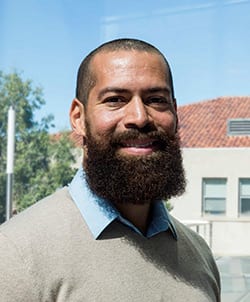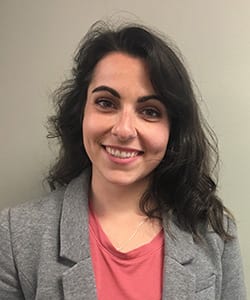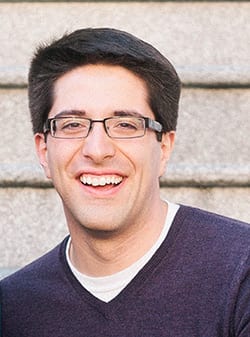By Andrew Cohen

Berkeley students helped a law school clinic gain a key victory in its national push to end administrative fees charged to families of youth in the juvenile justice system.
Like most states, Louisiana authorizes courts to charge families for their child’s detention, probation, and even their public defender. In response to a yearlong effort led by the Policy Advocacy Clinic (PAC), the Orleans Parish Juvenile Court adopted a policy to stop charging such fees, saying they undermine the system’s rehabilitative and public safety goals while yielding little net revenue.
Supervised by PAC Teaching Fellow Ahmed Lavalais ’17, law students Rey Fuentes ’19 and Brittany Sherron ’20 teamed with public policy students Cybele Kotonias and Andrea Lynn to help achieve this reform. The clinic’s key local partners included Families and Friends of Louisiana’s Incarcerated Children and the Louisiana Center for Children’s Rights.
“With this bold and commonsense action, New Orleans has become the first jurisdiction in the South to end the harmful and costly practice of charging juvenile fees,” Lavalais says. “The court should be commended for its leadership and serve as a model for the entire region.”
PAC Director Jeffrey Selbin says Lavalais and the students “worked very closely with our partners on the ground, and did a ton of the heavy lifting and advocacy. They conducted in-depth legal research and data analysis, traveled to Louisiana to interview stakeholders, and presented their findings and recommendations to the court—which voted to end the fees the same day.”
The clinic became a national leader on juvenile justice system fees after its research showed how they disproportionately harm low-income families and families of color in California and correlate with higher recidivism rates. That spurred Alameda County to eliminate such fees, other California counties followed suit, and a recent bill repealed the fees statewide. PAC recently hosted the first national convening on the issue to build a #DebtFreeJustice campaign to abolish juvenile fees in all 50 states.

In Louisiana, African Americans make up 37 percent of the youth population but represent more than 75 percent of the juvenile justice population—despite little difference between white and African American youth offense rates. Of the 1.1 million people under 18 in the state, 28 percent live below the federal poverty line.
Louisiana law authorizes courts to charge administrative fees for appointed counsel, probation supervision, public defenders, medical examinations, and care and treatment. Failure to pay can lead to collection actions, mortgage liens, tax refund garnishment, and contempt of court—putting parents at risk of incarceration, exacerbating poverty, and destabilizing families.
“The overwhelming majority of system-involved youth come from low-income families of color,” Sherron says. “Any amount of financial burden placed on them can be devastating.”
In some jurisdictions, collection costs exceed fee revenue because most families with youth in the juvenile system cannot afford to pay. From January 1, 2015 to April 24, 2017, Louisiana collected only 6 percent of the $2.1 million assessed.
Strategic approach
The four students made three trips to Louisiana. They met with local advocates, gathered copious background information, and drafted a memo merging these findings with PAC’s research on the state’s statutes, administrative guidance, and legislation related to juvenile fees.
“The memo was central to galvanizing our partners’ interest in reform,” Fuentes says. “It was an issue many people were surprised to learn was so pervasive in Louisiana.”
As it did in California, PAC first sought to persuade local officials to voluntarily stop imposing juvenile fees. The students helped draft materials for New Orleans judges with whom local partners had close relationships, including summaries of its memo and of available literature on the need for ending such fees.

“The policy the court adopted is voluntary and only targets certain discretionary juvenile fees, so continued advocacy and monitoring will be key,” Fuentes says. “But it’s a crucial step to show other courts and state policymakers that this important issue needs to be grappled with and resolved through additional policy change.”
In addition to meeting with local policy experts, juvenile public defenders, and community-based advocacy groups, Sherron observed court proceedings. While getting an audience with the court proved challenging, local partners helped make it happen.
“It can be tricky to come from Berkeley and try to effect change, because we’re effectively outsiders,” Sherron says. “It’s important that our partners on the ground and stakeholders in the state know we’re serious about change and are willing to be there when necessary.”
Sherron, who like Fuentes will continue working with PAC this school year, credits clinic leaders for fueling valuable connections and helping her land a fall field placement in the San Francisco Public Defender’s Office (Juvenile Division).
“I can’t begin to explain how incredibly valuable PAC’s supervisors are,” Sherron says of Selbin, Lavalais, and Clinical Supervising Attorney Stephanie Campos-Bui ’14. “The whole team is amazing. The other students are honestly some of the greatest people I know and are doing incredible work.”